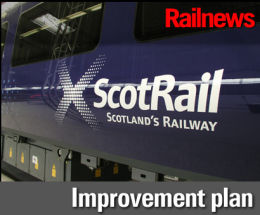Posted 20th October 2016 | 7 Comments
Major improvement plan for struggling ScotRail

THE ScotRail Alliance has unveiled a plan to improve performance, after managing director Phil Verster had described the task of upgrading the network while running trains day-to-day as like ‘performing open heart surgery while doing a marathon’.
Public criticism has been mounting: a petition calling for Abellio to lose its franchise has attracted more than 14,000 signatures, while there have also been questions in the Scottish Parliament.
The improvement plan includes £8 million for asset improvements, ‘specifically tailored’ upgrades for key parts of the network such as Edinburgh and the Borders, Lanarkshire and Tayside, and targeted work on rolling stock to deal with the most common faults.
‘Golden Trains’ – those services which, if they run late, are most likely to cause further delays to other trains – will be monitored and protected, while staff rostering and train diagramming will also be overhauled.
Meanwhile Phil Verster told a fringe event at the SNP conference: “When a railway gets really, really busy, we get trains delayed because there are so many people trying to get on a train, so many people trying to get off. So the journey gets longer and it’s less punctual.”
Abellio said: “We are committed to investing in Scotland and its railway. Under our stewardship, ScotRail has embarked on the biggest improvement and investment programme in the history of Scotland’s railway. This will mean more seats, shorter journeys, smart ticketing, improved WiFi and better stations.”
ScotRail Alliance infrastructure director David Dickson said: “We are not a just a company made up of metal boxes, wooden sleepers or concrete buildings. We have 7,500 people working for us – and every single one of them is dedicated to doing the very best for our customers.
“Our railway is undergoing the biggest period of change and modernisation since the Victorian era. Over the course of the next year or so we will be completing huge projects to upgrade our infrastructure, electrifying large parts of the network and introducing new fleets.”
Reader Comments:
Views expressed in submitted comments are that of the author, and not necessarily shared by Railnews.

Manchester Mike, Manchester
Phil Verster - "“When a railway gets really, really busy, we get trains delayed because there are so many people trying to get on a train, so many people trying to get off."
Nice to blame the passengers that use your service Phil!
Bring passenger trains back to public ownership.
david c smith, Bletchley
Alan McMillan makes an important point - the importane of havig an appropriate framework of incentives to encourage the operator to give the best to stakeholders.
Of course private companies try to maximise profits ; the trick is to harness this drive to benefit the public good.
alistair paxton, edinburgh
Just how often do we hear from a new franchise about how good their plans are, then for the next few years they disrupt their services 'upgrading' so the travelling public never get a good service because they bring out new plans for upgrading and so on and so on.
Alan McMillan, Edinburgh
It appears that Abellio have no great desire to run ScotRail properly, only profitably. If they can get bums on seats with the situation as it is and make a big enough profit, what would be their incentive to spend some of that profit on running the service any better?
Linda , Glasgow
Phil Verster says when a railway gets busy trains get delayed because it takes so long for people to get on and off! Great quote. Perhaps we should all get the bus and the trains will have less passengers and be on time. If they hadn't got rid of most of the turbostars and kept the ancient 156s and 158s with narrow doors we'd be able to get on and off quicker! It's always the passengers' fault with Abellio!
Noam Bleicher, OXFORD
The 'golden trains' concept is one I think we're all familiar with - trains which seem to run late all the time and cause disruption repeatedly. Of course these should be prioritised in the interests of the greater good of the network, but how will this work in a multi-operator environment? Current regulation rules mean trains running late out of path will not be prioritised ahead of those from another TOC. Will regulation rules have to change, and if so can we have some of this in England please?
Andrew, Lenzie
Abellio should not hide behind the upgrade works causing a lack of punctuality. The upgrade works do not cause trains to break down more frequently than when First Group ran the franchise. The upgrade works do not cause trains to be more dirty inside since Abellio took over the franchise. Abellio are attempting to run a similar level of service to First Group with fewer vehicles so there is less scope for maintaining and cleaning the trains properly.